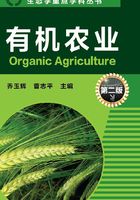
Forewords
It is a great pleasure for me to introduce to Chinese researchers and students this book on Organic farming.The book originates from an European project,carried out under the ASIA-LINK Programme,coordinated by the Centre of Competence AGROINNOVA of the University of Torino(Italy)and implemented in collaboration with the University of Tuscia(Italy),the University of Bonn(Germany),the University of Wageningen(The Netherlands),the China Agricultural University(P.R.China),the Zhejiang University(P.R.China),the Qinghai College of Animal Husbandry and Veterinary Medicine(P.R.China),and the Northeast Agricultural University(P.R.China).
Decades of intensive agriculture aimed at guarantee food security for a growing population have led in China to extremely negative impact on the environment,due to the overexploitation of natural resources and the excessive us of chemical fertilizers and pesticides.The project started in December 2005 with the aim to promote the culture of organic farming as a mean to protect the environment and human health among Chinese stakeholders,with particular attention to higher education institutions.
The project aimed to implement appropriate educational activities to develop human resources and curriculum on organic farming suitable to the Chinese educational context by promoting a network of higher education institutions from both China and Europe.The project addressed the need to build positive synergies between knowledge acquired by training and education,with policies and practices to be oriented towards a local sustainable development of the agricultural sector.Direct target groups were professors and associate professors,postgraduate and graduate students.The project indirectly addressed private and public industries,non-governmental and governmental organisations,playing a key role in raising awareness on organic farming.Project activities promoted sharing of technical,social,economical and ethical knowledge on organic farming based on the European advanced experience in the sector,with the aim to networking and strengthening the scientific collaborations in an innovative sector like organic farming.
Specific objectives were upgrading scientific and technical capacity of existing and future teaching staff from Chinese higher education institutions,and to develop relevant learning and teaching tools supporting the implementation of organic farming-oriented curricula within the Chinese partners’ Institutions.
Although developing common curricula is always a very difficult task even at a regional level,a core programme in organic farming,to be shared among the different Universities,has been established throughout the project.
Moreover,a network of young researchers working in Europe and China in the field of organic farming has been established.These people will be able to interact in the future,generating more common activities.
The publication of this book is the demonstration that the final goal of the project,to enhance capacity of handling interdisciplinary complex issues in organic farming,has been achieved.
I hope that all readers will appreciate this effort and wish to thank the many Chinese and European colleagues and students who did partecipate into the project.
M.Lodovica Gullino
President,International Society for Plant Pathology
Vice Rector for International Affairs,University of Torino